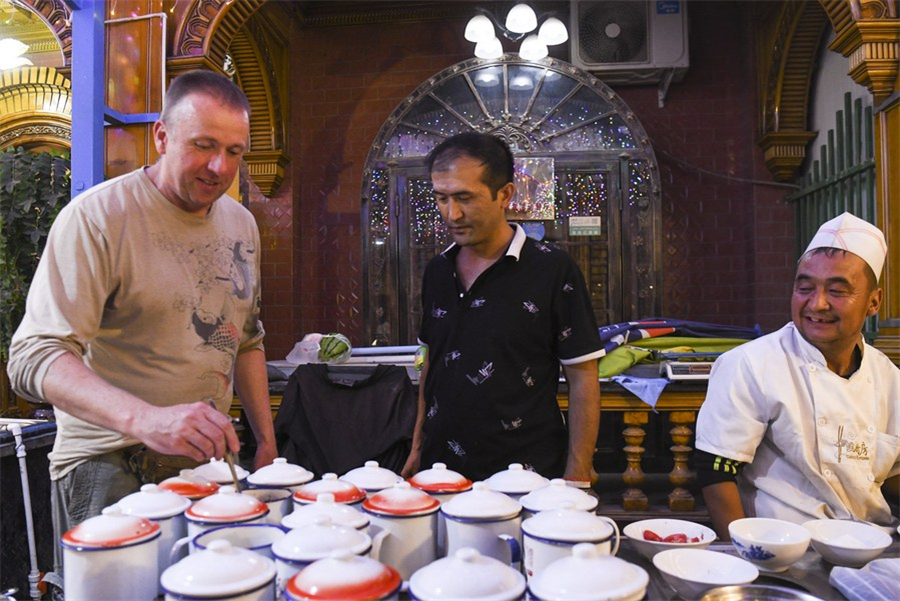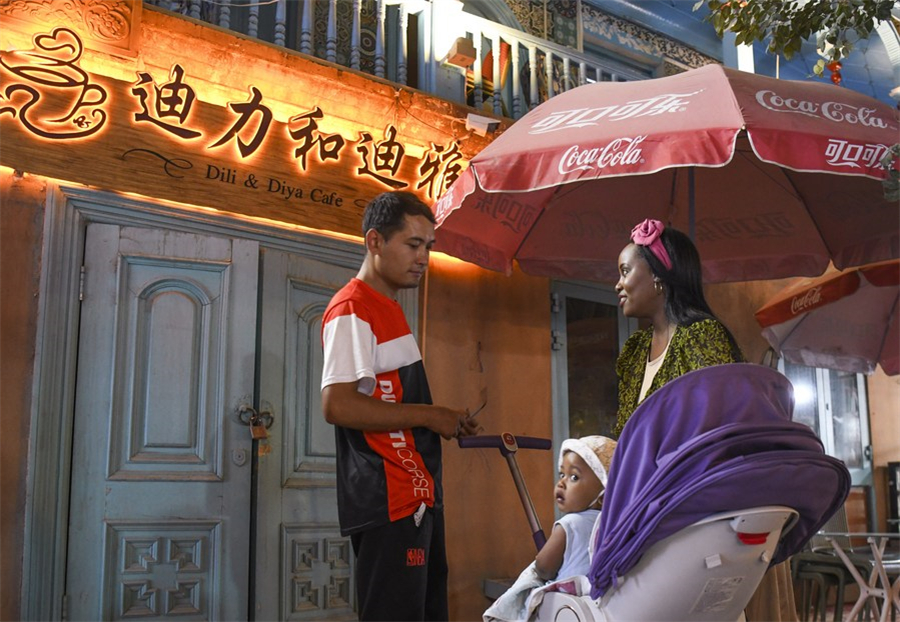A vibrant city on ancient Silk Road -- Kashgar in the eyes of foreign tourists
* The ancient city of Kashgar in Xinjiang has greeted over 7 million tourists so far this year.
* Famous for its diverse and colorful culture and architecture, tourism has continued to boom with travelers from all around the world going there.
* Since the Belt and Road Initiative was proposed, the ancient city has once again been propelled into the limelight as a gateway for opening up.
URUMQI -- The ancient city of Kashgar, which has a permanent resident population of around 200,000 and is located in northwest China's Xinjiang Uygur Autonomous Region, has greeted over 7 million tourists so far this year.
Apart from domestic tourists, there are also motorcycle travelers from Europe, foreign journalists and a young Tanzanian woman, with the latter having decided to settle down there.

Neil Munro (L), a motorcycle traveler from Britain, buys local characteristic food jar meat at a restaurant in Kashgar, northwest China's Xinjiang Uygur Autonomous Region, Sept. 14, 2023. [Xinhua/Wang Fei]
Since the Belt and Road Initiative was proposed, the ancient city has once again been propelled into the limelight as a gateway for opening up.
BOOMING TOURISM, BETTER INFRASTRUCTURE
As the night closes in, streetlights flicker on, and Kashgar becomes even more alive with tourists joyously exploring a city with a history of more than 2,000 years.
Neil Munro, from Britain, walks into a restaurant with friends to savour the famous local barbecue and beer.
Munro's tour group of seven hails from seven different countries -- Britain, France, Germany, Italy, Switzerland, New Zealand and Finland. Their passion for motorcycling brought them together on a trip which started in Bishkek in Kyrgyzstan, from where they traveled to Kashgar via the Irkeshtam port.
After a two-day stay in Kashgar, the group will motorcycle through several other Chinese provinces including Gansu, Sichuan and Yunnan, before finally arriving in Laos.
This is Munro's third visit to Kashgar. When he first traveled there in 1999, he was wowed by the unique culture and he soon began learning Chinese.
"At that time, there were only some old buildings in the ancient city, the streets were narrow and dirty. Now, it is clean and beautiful, more comfortable and more attractive," Munro said.
The ancient city of Kashgar is one of the largest surviving earthen buildings in the world.
In 2010, a renovation project with an investment value exceeding 7 billion yuan (about 975 million U.S. dollars) was launched. Within seven years, the dilapidated houses were rebuilt but without changing their architectural characteristics and their traditional Uygur lifestyles.
Provided with such improved infrastructure, residents of the ancient city not only started to lead safer and more comfortable lives, but were also placed in a position more suitable for boosting modern tourism.

Motorcycle travelers from abroad take selfies before their trip in Kashgar, northwest China's Xinjiang Uygur Autonomous Region, Sept. 16, 2023. [Xinhua/Wang Fei]
"The people in the ancient city of Kashgar are very welcoming, while the food here is the best I've ever eaten east of Florence. I feel that Kashgar is full of energy," said Sirpa Jarvenpa, from Finland, who took part in the long motorcycle ride along with her husband.
"Kashgar creates a fun and romantic atmosphere, and we can find Central Asian cuisine, but also food from other parts of China, which you probably can't experience in Shanghai or Beijing," said Robert Zagorski, who comes from Poland and arrived in Kashgar with another motorcycle fleet.
MORE OPPORTUNITIES
Already famous for many years because of its diverse and colorful culture and architecture, tourism has continued to boom in the ancient city of Kashgar in recent times, with travelers from all around the world going there.
On Oct. 1 this year, the National Day in China, the single-day tourist arrival in the ancient city of Kashgar reached 120,000, while flights were almost fully booked during this year's eight-day National Day holiday period.
This thriving tourism industry has also nurtured a sound business climate and drawn young entrepreneurs from many corners of the globe.
Hadiya Msham Abulla, from Tanzania, runs a cafe in the ancient city of Kashgar with her husband Dilshat Tursun. The two met while studying at a university in east China's Fujian Province seven years ago.

Dilshat Tursun (L) and his wife Hadiya Msham Abulla prepare to bring their child home in Kashgar, northwest China's Xinjiang Uygur Autonomous Region, Sept. 15, 2023. [Xinhua/Wang Fei]
Bullish on China's soaring coffee consumption potential and economic prospects in Kashgar, where Dilshat Tursun was born, the couple decided to settle and start their own business in Kashgar.
"The ancient city of Kashgar is a place full of passion and fantasy. Despite living in a foreign land, I sense the feeling of home from the hospitable folks, and here I found the direction to start my own business," Abulla said.
China's coffee market is recognized by investors as a blue ocean. Though only in business for more than half a year, the couple are already planning to ship high-quality beans from Tanzania and other African countries to Kashgar and elsewhere in China.
Thanks to the BRI, African coffee beans have secured a much wider market share in China in recent years. Abulla recently imported 300 kg of Tanzanian coffee beans to Kashgar, which received a flood of positive feedback far exceeding expectations.
"There's just no way to keep up with the demand, and as business gets better, we need more beans," Abulla said. "The shipping time is too long and the cost of air freight is too high. We plan to make the logistics smoother with the help of the BRI."
Dilshat Tursun was engaged in e-commerce and international trade in Fujian. These days he is trying to transport a batch of goods to China via the China-Europe train route.
Abulla's father has visited China four times and is always amazed at how fast China develops. Passionate about Chinese culture and yearning to meet his family, her father is already planning his fifth trip to China.
RAPID ECONOMIC DEVELOPMENT
Though living just 600 km away, it is the first time Abdukakhorov Usmon, from Dushanbe in Tajikistan, is visiting the ancient city of Kashgar.
While immersing himself in the dazzling array of handicrafts, exquisite bronzeware, wood products and potteries on display along the streets, Abdukakhorov Usmon also noted the striking resemblance between Kashgar and his home country.
"The drum beats are similar, and so are the smells of patchouli black tea and mint green tea in the air," noted Abdukakhorov Usmon, a journalist from Avesta News Agency of Tajikistan.
"Xinjiang is developing better than I imagined," Abdukakhorov Usmon said. "I hope that more products from Tajikistan can be exported to Xinjiang and other regions in China in the future."

Hadiya Msham Abulla interacts with her child at her cafe in Kashgar, northwest China's Xinjiang Uygur Autonomous Region, Sept. 15, 2023. [Xinhua/Wang Fei]
Cross-border trade has entered a fast track of growth, underpinned by improvements in infrastructure and efforts to streamline and simplify trade procedures under the BRI.
"Tajikistan and China's Xinjiang are very close, and the potential for cooperation is huge. In recent years, with the deepening of the BRI, the lives of people in Tajikistan have improved significantly. I hope that China and Tajikistan can continue to cooperate within the framework of the BRI, especially in-depth cooperation in the field of technology," he said.
Benefiting from the BRI, the free trade zone in Kashgar has seen its trade volume double from 2020 to 2022.
In the first seven months of this year, total import and export value in the zone reached 21.82 billion yuan, an increase of 178 percent year on year, according to Ge Hongliang, deputy director of the Kashgar Free Trade Zone Management Committee.
Video reporter: Zhang Xiaocheng; video editors: Wu Yao, Zhao Xiaoqing, Lin Lin and Wang Han
























